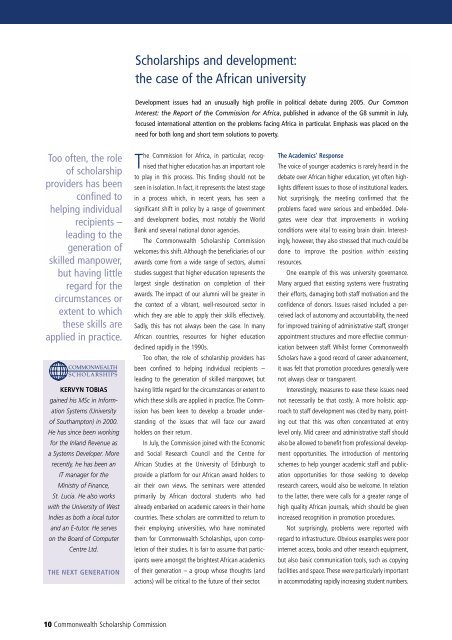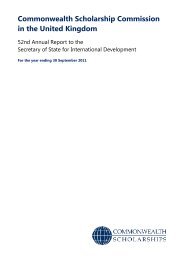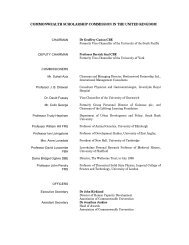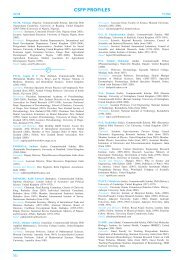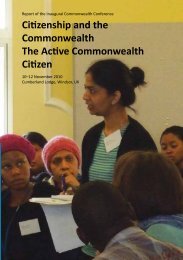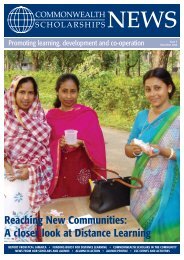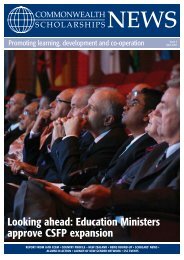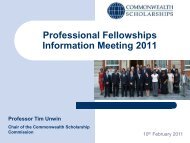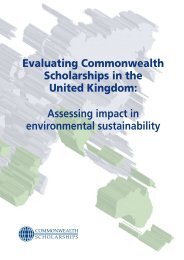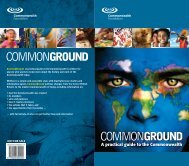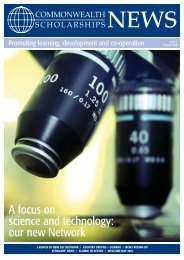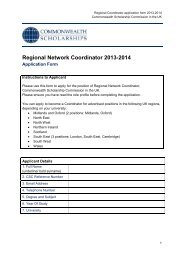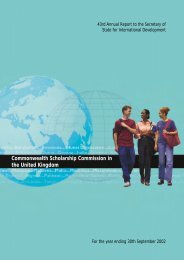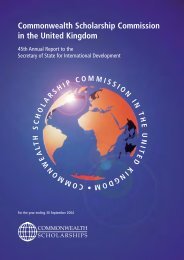46th Annual Report - Commonwealth Scholarship Commission in ...
46th Annual Report - Commonwealth Scholarship Commission in ...
46th Annual Report - Commonwealth Scholarship Commission in ...
- No tags were found...
You also want an ePaper? Increase the reach of your titles
YUMPU automatically turns print PDFs into web optimized ePapers that Google loves.
<strong>Scholarship</strong>s and development:the case of the African universityDevelopment issues had an unusually high profile <strong>in</strong> political debate dur<strong>in</strong>g 2005. Our CommonInterest: the <strong>Report</strong> of the <strong>Commission</strong> for Africa, published <strong>in</strong> advance of the G8 summit <strong>in</strong> July,focused <strong>in</strong>ternational attention on the problems fac<strong>in</strong>g Africa <strong>in</strong> particular. Emphasis was placed on theneed for both long and short term solutions to poverty.Too often, the roleof scholarshipproviders has beenconf<strong>in</strong>ed tohelp<strong>in</strong>g <strong>in</strong>dividualrecipients –lead<strong>in</strong>g to thegeneration ofskilled manpower,but hav<strong>in</strong>g littleregard for thecircumstances orextent to whichthese skills areapplied <strong>in</strong> practice.KERVYN TOBIASga<strong>in</strong>ed his MSc <strong>in</strong> InformationSystems (Universityof Southampton) <strong>in</strong> 2000.He has s<strong>in</strong>ce been work<strong>in</strong>gfor the Inland Revenue asa Systems Developer. Morerecently, he has been anIT manager for theM<strong>in</strong>istry of F<strong>in</strong>ance,St. Lucia. He also workswith the University of WestIndies as both a local tutorand an E-tutor. He serveson the Board of ComputerCentre Ltd.THE NEXT GENERATIONThe <strong>Commission</strong> for Africa, <strong>in</strong> particular, recognisedthat higher education has an important roleto play <strong>in</strong> this process. This f<strong>in</strong>d<strong>in</strong>g should not beseen <strong>in</strong> isolation. In fact, it represents the latest stage<strong>in</strong> a process which, <strong>in</strong> recent years, has seen asignificant shift <strong>in</strong> policy by a range of governmentand development bodies, most notably the WorldBank and several national donor agencies.The <strong>Commonwealth</strong> <strong>Scholarship</strong> <strong>Commission</strong>welcomes this shift. Although the beneficiaries of ourawards come from a wide range of sectors, alumnistudies suggest that higher education represents thelargest s<strong>in</strong>gle dest<strong>in</strong>ation on completion of theirawards. The impact of our alumni will be greater <strong>in</strong>the context of a vibrant, well-resourced sector <strong>in</strong>which they are able to apply their skills effectively.Sadly, this has not always been the case. In manyAfrican countries, resources for higher educationdecl<strong>in</strong>ed rapidly <strong>in</strong> the 1990s.Too often, the role of scholarship providers hasbeen conf<strong>in</strong>ed to help<strong>in</strong>g <strong>in</strong>dividual recipients –lead<strong>in</strong>g to the generation of skilled manpower, buthav<strong>in</strong>g little regard for the circumstances or extent towhich these skills are applied <strong>in</strong> practice. The <strong>Commission</strong>has been keen to develop a broader understand<strong>in</strong>gof the issues that will face our awardholders on their return.In July, the <strong>Commission</strong> jo<strong>in</strong>ed with the Economicand Social Research Council and the Centre forAfrican Studies at the University of Ed<strong>in</strong>burgh toprovide a platform for our African award holders toair their own views. The sem<strong>in</strong>ars were attendedprimarily by African doctoral students who hadalready embarked on academic careers <strong>in</strong> their homecountries. These scholars are committed to return totheir employ<strong>in</strong>g universities, who have nom<strong>in</strong>atedthem for <strong>Commonwealth</strong> <strong>Scholarship</strong>s, upon completionof their studies. It is fair to assume that participantswere amongst the brightest African academicsof their generation – a group whose thoughts (andactions) will be critical to the future of their sector.The Academics’ ResponseThe voice of younger academics is rarely heard <strong>in</strong> thedebate over African higher education, yet often highlightsdifferent issues to those of <strong>in</strong>stitutional leaders.Not surpris<strong>in</strong>gly, the meet<strong>in</strong>g confirmed that theproblems faced were serious and embedded. Delegateswere clear that improvements <strong>in</strong> work<strong>in</strong>gconditions were vital to eas<strong>in</strong>g bra<strong>in</strong> dra<strong>in</strong>. Interest<strong>in</strong>gly,however, they also stressed that much could bedone to improve the position with<strong>in</strong> exist<strong>in</strong>gresources.One example of this was university governance.Many argued that exist<strong>in</strong>g systems were frustrat<strong>in</strong>gtheir efforts, damag<strong>in</strong>g both staff motivation and theconfidence of donors. Issues raised <strong>in</strong>cluded a perceivedlack of autonomy and accountability, the needfor improved tra<strong>in</strong><strong>in</strong>g of adm<strong>in</strong>istrative staff, strongerappo<strong>in</strong>tment structures and more effective communicationbetween staff. Whilst former <strong>Commonwealth</strong>Scholars have a good record of career advancement,it was felt that promotion procedures generally werenot always clear or transparent.Interest<strong>in</strong>gly, measures to ease these issues neednot necessarily be that costly. A more holistic approachto staff development was cited by many, po<strong>in</strong>t<strong>in</strong>gout that this was often concentrated at entrylevel only. Mid career and adm<strong>in</strong>istrative staff shouldalso be allowed to benefit from professional developmentopportunities. The <strong>in</strong>troduction of mentor<strong>in</strong>gschemes to help younger academic staff and publicationopportunities for those seek<strong>in</strong>g to developresearch careers, would also be welcome. In relationto the latter, there were calls for a greater range ofhigh quality African journals, which should be given<strong>in</strong>creased recognition <strong>in</strong> promotion procedures.Not surpris<strong>in</strong>gly, problems were reported withregard to <strong>in</strong>frastructure. Obvious examples were poor<strong>in</strong>ternet access, books and other research equipment,but also basic communication tools, such as copy<strong>in</strong>gfacilities and space.These were particularly important<strong>in</strong> accommodat<strong>in</strong>g rapidly <strong>in</strong>creas<strong>in</strong>g student numbers.10 <strong>Commonwealth</strong> <strong>Scholarship</strong> <strong>Commission</strong>


